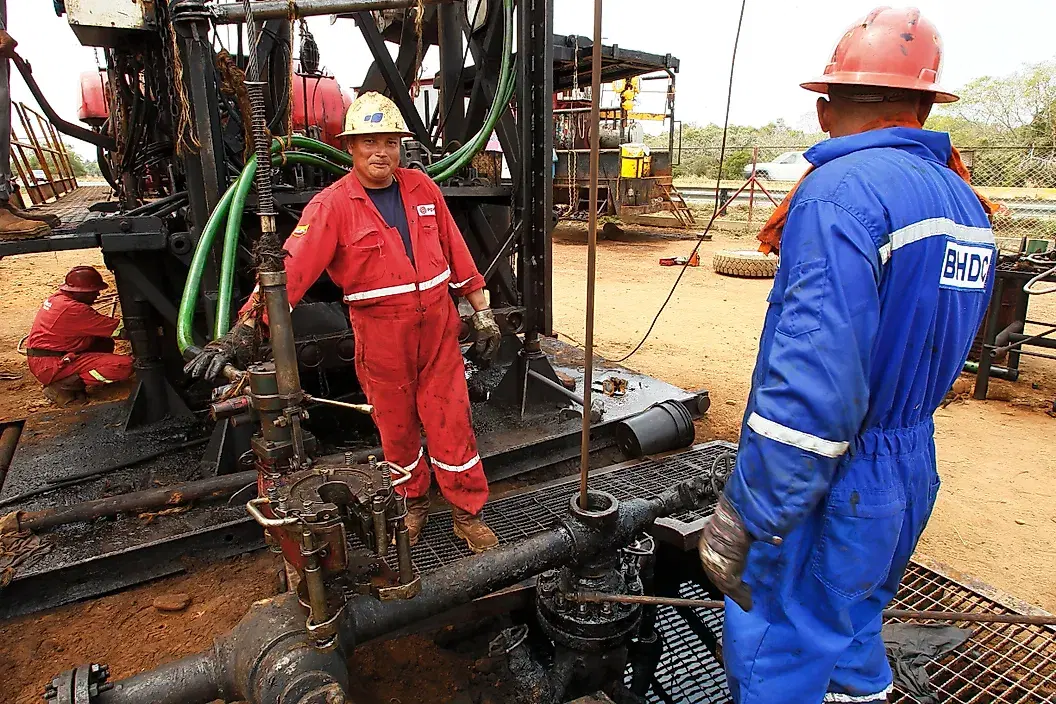As of 2024, the global distribution of oil reserves highlights a dynamic and evolving energy landscape. Countries with the largest oil reserves continue to play a pivotal role in shaping the world’s energy markets and geopolitical strategies. This overview, based on World Atlas rankings, showcases the key players and their contributions to the global energy supply, reflecting both the enduring importance of fossil fuels and shifts in production and consumption patterns.
1. VENEZUELA
In 2024, Venezuela remains a major player in the oil industry, holding the world’s largest oil reserves at over 303.22 billion barrels. These reserves place Venezuela at the top of the global rankings, ahead of countries like Saudi Arabia, Canada, and Iran. The majority of Venezuela’s reserves are located in the Orinoco Belt, known for its heavy crude oil. Despite its vast resources, Venezuela struggles with political instability, economic mismanagement, and international sanctions, which impede its oil production and export capabilities.
2. SAUDI ARABIA
As of 2024, Saudi Arabia holds the world’s second-largest proven oil reserves, estimated at 267.19 billion barrels. This significant reserve underpins Saudi Arabia’s role as a global energy leader and ensures its influence in international oil markets, even though it is surpassed by Venezuela in total reserves. Saudi Aramco, the state-owned giant, remains a cornerstone of the nation’s economy, with oil revenue fueling the Vision 2030 plan to diversify beyond oil dependency.
3. IRAN
In 2024, Iran ranks as the world’s third-largest holder of proven oil reserves, with an estimated 208.60 billion barrels. Despite facing challenges such as international sanctions and geopolitical tensions, Iran’s immense resource base makes it a key player in the global oil industry. The country’s oil sector is vital to its economy, with the National Iranian Oil Company (NIOC) overseeing production and distribution. Iran’s oil wealth ensures it remains a significant force in the energy market.
4. CANADA
Canada ranks as the world’s fourth-largest holder of proven oil reserves in 2024, with an estimated 163.63 billion barrels. Most of these reserves are located in Alberta’s oil sands, making Canada a crucial player in the global oil industry and the largest oil reserve holder in the Western Hemisphere. Canada’s oil sector is a major economic contributor, with private companies driving the industry, while provincial and federal governments play key roles in regulation and oversight.
5. IRAQ
In 2024, Iraq holds the fifth-largest proven oil reserves globally, with an estimated 145.02 billion barrels. Iraq’s vast oil wealth is central to its economy, providing substantial government revenue and funding essential services and infrastructure. Managed by state-owned enterprises and international oil companies, Iraq’s oil industry remains a major exporter, particularly to Asia and Europe, despite challenges such as political instability and underinvestment in infrastructure.
6. UNITED ARAB EMIRATES
The United Arab Emirates (UAE) holds the world’s sixth-largest proven oil reserves in 2024, estimated at 113.00 billion barrels. The UAE’s oil wealth, primarily in Abu Dhabi, has significantly influenced its economic development and global standing. The Abu Dhabi National Oil Company (ADNOC) manages the UAE’s efficient oil industry. While oil exports are a major revenue source, the UAE has also invested in diversifying its economy through tourism, finance, and renewable energy, aligning with its Vision 2030 plan.
7. KUWAIT
Kuwait ranks as the seventh-largest holder of proven oil reserves in 2024, with approximately 101.50 billion barrels. This substantial reserve is a critical component of Kuwait’s economy, contributing significantly to national revenue and global economic influence. Known for its advanced extraction technologies and efficient operations, Kuwait’s oil industry helps sustain its robust production levels.
8. RUSSIA
Russia holds the eighth-largest proven oil reserves globally in 2024, with an estimated 80.00 billion barrels. As a leading energy producer, Russia’s oil reserves are vital to its economy and geopolitical influence. State-owned companies like Rosneft and Gazprom Neft dominate the oil industry, and Russia’s role as a major exporter, especially to Europe and Asia, is reinforced by its membership in the OPEC+ alliance, impacting global oil prices.
9. UNITED STATES
The United States ranks as the ninth-largest holder of proven oil reserves in 2024, with an estimated 55.25 billion barrels. Although lower in reserves compared to some other oil-rich nations, the U.S. remains a top oil producer and exporter due to advanced technologies and efficient production methods, particularly in shale oil. The U.S. oil industry, driven by private companies, significantly impacts economic growth and energy security.
10. LIBYA
Libya ranks as the tenth-largest holder of proven oil reserves in 2024, with an estimated 48.36 billion barrels. These reserves are the largest in Africa, making Libya a key player in the continent’s energy sector and a significant contributor to global oil supplies. Managed by the National Oil Corporation (NOC), Libya’s oil industry is the backbone of its economy, although production has been affected by political instability, conflict, and infrastructure challenges.

